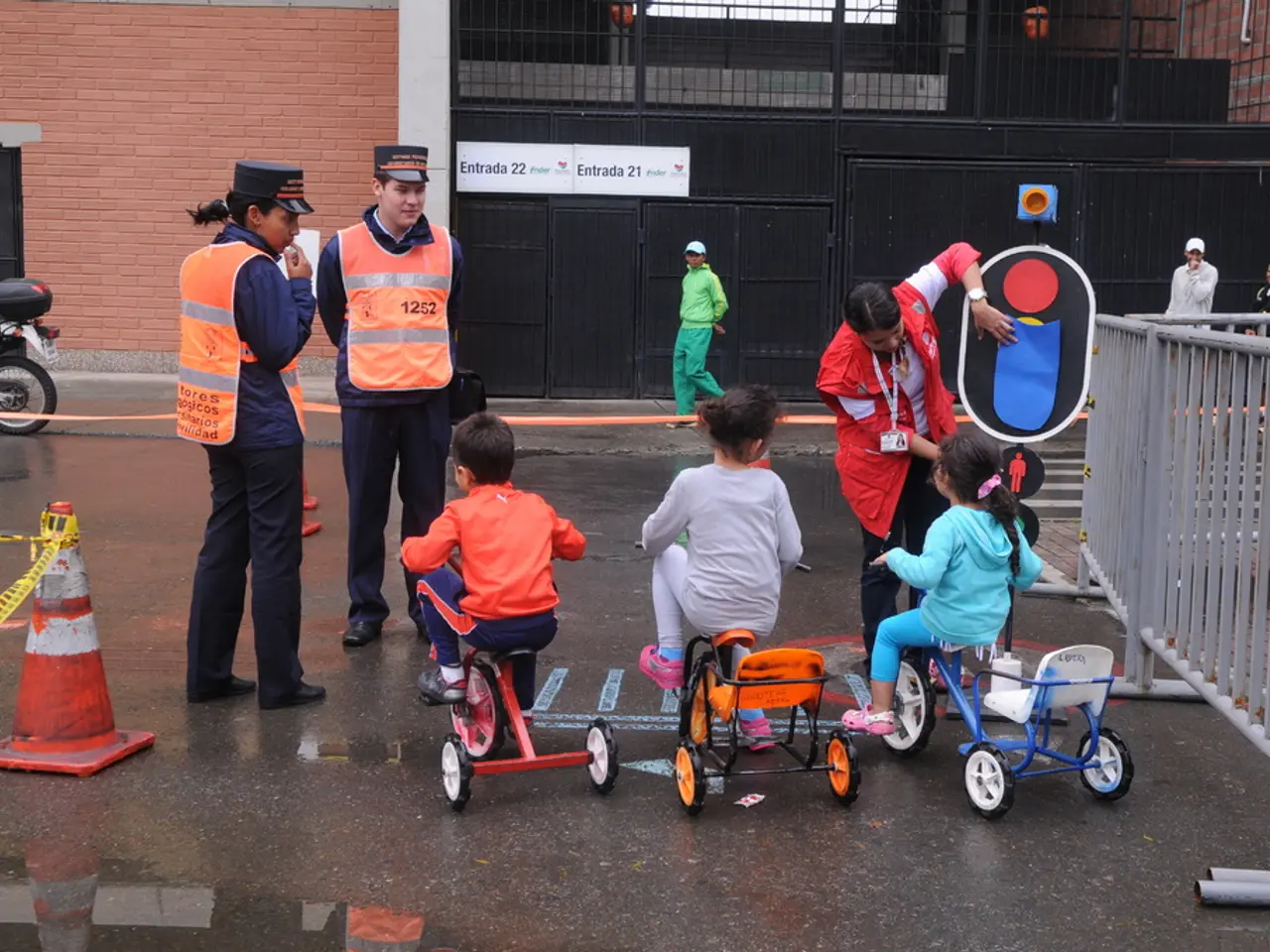Parents Encouraged by Traffic Authorities to Adopt Cycling Safety Habits
Berlin, the vibrant capital city of Germany, is taking strides to ensure the safety of its young cyclists. The Traffic Safety Association, along with the Berlin Senate Administration for Education, has emphasised the importance of cycling as an essential form of active and independent mobility that strengthens traffic safety.
According to the experts, regular practice is crucial for children to develop the motor memory required for cycling. Many children may not be sufficiently motorically prepared, and problems with starting, lane keeping, braking, or one-handed riding are not uncommon. To address this, the focus should be on additional practical strategies beyond school cycling training.
One such strategy is regular family cycling practice and skill-building activities. Participating in community cycling events like Berlin's Family Bike Day can provide a supportive environment for such practice, including bike repairs and expert tips. Another approach is to use safe cycling infrastructure and traffic-calmed streets, such as protected bike lanes and school street zones, which promote safer environments for young cyclists.
The city of Berlin poses a high challenge for children when cycling due to constant mental stimulation from various road users. To help children become confident and responsible cyclists within Berlin's urban context, it's essential to familiarize them with local cycling rules and safety practices, including helmet use, signaling, stopping, and obeying traffic lights.
Incorporating city-wide initiatives and national plans that encourage cycling safety and physical activity can also support this goal. The National Cycling Plan 2020 in Germany promotes bicycle-friendly measures, which could support increased cycling practice opportunities and safer urban environments for children in Berlin.
Promoting gender-inclusive and accessible cycling programs is also crucial. Initiatives to improve safety and accessibility for all children, including girls, can enhance cycling participation and safety culture.
However, Berlin's youth traffic schools, though numerous, often have limited opening hours, making additional practice difficult for parents. The expert, Josef Weiß, sees potential for improvement in the opening hours of these schools.
A few decades ago, the bicycle was a daily means of transport for children, but today, in some families, the bicycle plays a lesser role. The pandemic has exacerbated the lack of movement in some families, making it more important than ever to encourage cycling practice with children.
Particularly challenging are so-called multiple demands, which involve simultaneously driving, looking around, giving hand signals, and anticipating traffic situations. The expert advises parents to go on outings, cycle together, and help their children develop routines.
Three-year-old children who are motorically advanced may not encounter problems with cycling later. However, it's essential to remember that practice makes perfect, and regular cycling practice is key to ensuring children's safety on Berlin's streets.
In summary, children’s cycling safety in Berlin can be improved by combining school training with ongoing practice in safe environments, supported by traffic calming in school neighborhoods, national cycling promotion policies, familiarization with local traffic rules, and inclusive community cycling programs. This layered approach builds skills, confidence, and safer conditions for young cyclists.
Science plays a crucial role in developing strategies for children's health and wellness, as it helps understand the motor skills needed for cycling. This knowledge is essential for creating fitting fitness-and-exercise programs and addressing common challenges like starting, lane keeping, braking, or one-handed riding.
To promote learning and self-development, Berlin encourages community events like Family Bike Day, offering valuable educational experiences through bike repairs and expert tips. Such activities can help children grow in sports while fostering a sense of belonging.
Parenting becomes instrumental in building confidence and responsibility in young cyclists. By adopting practices such as regular family cycling and skill-building activities, parents can make a positive impact on their children's cycling safety and development.
Education extends beyond schools in Berlin, where national plans like the National Cycling Plan 2020 promote bicycle-friendly measures to enhance cycling practice opportunities and safety for all children. These initiatives are vital in shaping a healthier and more active generation in the city.




